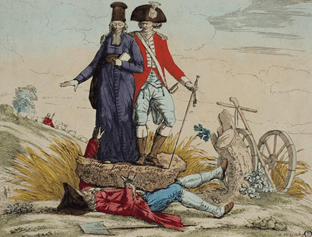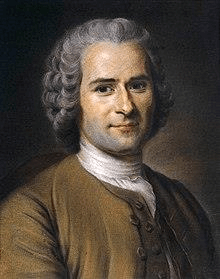Class 9 Exam > Class 9 Questions > Due to what reason did french revolution take...
Start Learning for Free
Due to what reason did french revolution take place?
?Most Upvoted Answer
Due to what reason did french revolution take place? Related: Short A...
1) The people revolted against the cruel regime of monarchy.
2)This revolution put forward the ideas of liberty, fraternity, and equality.
3(The revolution began on 14th July, 1789 with the storming of the fortress-prison, the Bastille.
4)The Bastille was hated by all, because it stood for the despotic power of the king.
2)This revolution put forward the ideas of liberty, fraternity, and equality.
3(The revolution began on 14th July, 1789 with the storming of the fortress-prison, the Bastille.
4)The Bastille was hated by all, because it stood for the despotic power of the king.
Community Answer
Due to what reason did french revolution take place? Related: Short A...
CAUSES OF THE FRENCH REVOLUTION
1. Political Causes:
(a) The political structure of the French state was highly unpopular with the people who were burdened with heavy taxes and insecure conditions of life and property.
(b) Divine rights of the kings, despotism and tyranny of the French monarchs topped by the extravagance and inefficiency of the Bourbon Kings.
(c) Louis XV indulged in a life of ease and pleasure, was not interested in administrative reforms or the welfare of the people.
(d) Louis XVI though good natured was completely under the influence of incompetent and corrupt ministers and a domineering queen of Austria, Marie Antoinette.
(e) Absence of any representative body to voice the need of the people. Local bodies called Parliament were courts of justice rather than voices of people.
1. Political Causes:
(a) The political structure of the French state was highly unpopular with the people who were burdened with heavy taxes and insecure conditions of life and property.
(b) Divine rights of the kings, despotism and tyranny of the French monarchs topped by the extravagance and inefficiency of the Bourbon Kings.
(c) Louis XV indulged in a life of ease and pleasure, was not interested in administrative reforms or the welfare of the people.
(d) Louis XVI though good natured was completely under the influence of incompetent and corrupt ministers and a domineering queen of Austria, Marie Antoinette.
(e) Absence of any representative body to voice the need of the people. Local bodies called Parliament were courts of justice rather than voices of people.
2. Social Forces:
(a) The unfair division of French society and its feudal nature were also responsible for the revolution.

(a) The unfair division of French society and its feudal nature were also responsible for the revolution.

Fig: Clergy and Nobles suppress commoners
(b) The first two estates enjoyed all the privileges and benefits in the society. The third estate was fraught with inequalities and discriminations. Most of the burden of taxation was borne by the least privileged and most impoverished third estate.
(c) Middle class was most receptive to new ideas and values as they were educated and has a broader outlook , denied the whole ideas, rights and privileged existence where the main qualification is that of birth and instead favored the criteria of merit.
(c) Middle class was most receptive to new ideas and values as they were educated and has a broader outlook , denied the whole ideas, rights and privileged existence where the main qualification is that of birth and instead favored the criteria of merit.
3. Economic Unrest:
(a) In the 18th century the condition of common man had become pathetic, problem of subsistence due to failure of crops, increase in the prices of food grains
(b) In the second half of the 18th century the French economy had started expanding, but its financial impact was uneven, hardest hit were the Third Estate
(c) Between 1689 and 1783 French fought several long and exhausting wars which proved to be disastrous both in terms of French Manpower and finances, not only led to mounting debts but interest on these debts also multiplied.
(d) To meet its mounting costs the government increased taxes. Peasantry was the hardest hit who owned the minimum land and paid the maximum taxes.
(e) Taxes were Taille the direct land tax, salt tax known as Gabelle, feudal dues or payments were taken by nobility and taxes know as Tithe was taken by the Church.
(a) In the 18th century the condition of common man had become pathetic, problem of subsistence due to failure of crops, increase in the prices of food grains
(b) In the second half of the 18th century the French economy had started expanding, but its financial impact was uneven, hardest hit were the Third Estate
(c) Between 1689 and 1783 French fought several long and exhausting wars which proved to be disastrous both in terms of French Manpower and finances, not only led to mounting debts but interest on these debts also multiplied.
(d) To meet its mounting costs the government increased taxes. Peasantry was the hardest hit who owned the minimum land and paid the maximum taxes.
(e) Taxes were Taille the direct land tax, salt tax known as Gabelle, feudal dues or payments were taken by nobility and taxes know as Tithe was taken by the Church.
4. A growing middle class envisages an end to Privileges:
(a) The French Revolution drew its strength from the ideas of philosophers and thinkers of the time, groups of intellectuals classified by scholars according to their thinking,
(b) Physiocrats, Philosophers and some others were grouped as liberals depending on their ideologies.
(c) Greatest thinkers were Francois Marie, Arouet de Voltaire, Jean Jacques Rousseau, Charles Louis Montesquieu, John Locke and Diderot to name a few.

Fig: Jean Jacques Rousseau
5. Contribution of the thinkers:
(a) Charles Montesquieu: A nobleman by birth, he become a lawyer and a judge. He preferred constitutional monarchy in France, he popularized the theory of powers within the government between the legislative , the executive and the judiciary in his book “The Spirit of the Laws”
(b) Francis Aronet Voltaire: He was another outstanding philosopher of the revolution. He wanted the people to think about their material life on earth and forget about heaven. He condemned the Church which supported the ignored the poor.
(c) Jean Jacques Rousseau: He is regarded as the architect of the French Revolution In the famous book “The Social Contract”, he proved that the government was the result of a social contract between the people on one hand and ruler on the other. So if the ruler didn’t fulfill the contract, the people had the right to withdraw their loyalty to him and bring down the tyranny of the ruler by revolting against him.
(d) John Locke: He was a great political thinker. He wrote “Two Treatises of Government “in which he sought to refute the doctrine of the divine and absolute right of monarch.
Attention Class 9 Students!
To make sure you are not studying endlessly, EduRev has designed Class 9 study material, with Structured Courses, Videos, & Test Series. Plus get personalized analysis, doubt solving and improvement plans to achieve a great score in Class 9.

|
Explore Courses for Class 9 exam
|

|
Due to what reason did french revolution take place? Related: Short Answer Questions - The French Revolution?
Question Description
Due to what reason did french revolution take place? Related: Short Answer Questions - The French Revolution? for Class 9 2024 is part of Class 9 preparation. The Question and answers have been prepared according to the Class 9 exam syllabus. Information about Due to what reason did french revolution take place? Related: Short Answer Questions - The French Revolution? covers all topics & solutions for Class 9 2024 Exam. Find important definitions, questions, meanings, examples, exercises and tests below for Due to what reason did french revolution take place? Related: Short Answer Questions - The French Revolution?.
Due to what reason did french revolution take place? Related: Short Answer Questions - The French Revolution? for Class 9 2024 is part of Class 9 preparation. The Question and answers have been prepared according to the Class 9 exam syllabus. Information about Due to what reason did french revolution take place? Related: Short Answer Questions - The French Revolution? covers all topics & solutions for Class 9 2024 Exam. Find important definitions, questions, meanings, examples, exercises and tests below for Due to what reason did french revolution take place? Related: Short Answer Questions - The French Revolution?.
Solutions for Due to what reason did french revolution take place? Related: Short Answer Questions - The French Revolution? in English & in Hindi are available as part of our courses for Class 9.
Download more important topics, notes, lectures and mock test series for Class 9 Exam by signing up for free.
Here you can find the meaning of Due to what reason did french revolution take place? Related: Short Answer Questions - The French Revolution? defined & explained in the simplest way possible. Besides giving the explanation of
Due to what reason did french revolution take place? Related: Short Answer Questions - The French Revolution?, a detailed solution for Due to what reason did french revolution take place? Related: Short Answer Questions - The French Revolution? has been provided alongside types of Due to what reason did french revolution take place? Related: Short Answer Questions - The French Revolution? theory, EduRev gives you an
ample number of questions to practice Due to what reason did french revolution take place? Related: Short Answer Questions - The French Revolution? tests, examples and also practice Class 9 tests.

|
Explore Courses for Class 9 exam
|

|
Suggested Free Tests
Signup for Free!
Signup to see your scores go up within 7 days! Learn & Practice with 1000+ FREE Notes, Videos & Tests.























